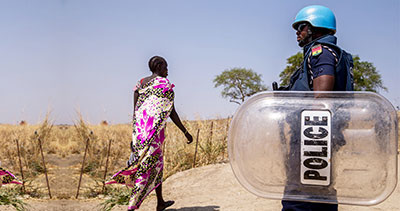Call for Application: Responsibility to Protect (R2P 21)
Peace Support Operations

Course Fee: Course is Free. KAIPTC shall be responsible for participant’s travel (within Africa, accommodation and feeding during the duration of the course).
Terms and Conditions:
Participants who will require visa on arrival will also be responsible for their visa feesEvery participant must have proof of adequate health insurance coverage before travelling to the Centre.KAIPTC will not bear any health or accident costs for any participant.
| In short | |
| Course Date/Duration | 22 November – 03 December 2021 |
| Course Capacity | 24 participants |
| Target Group | Policy makers, Military, police and civilian peacekeepers, NGOs, RECs, Representatives from the National Peace Councils, CSOs, Officials of the Ministries of Interior, Foreign Affairs and Justice. |
| Course Language | English |
| Application Deadline | 29 October 2021 |
Introduction
The concept of Responsibility to Protect (R2P) was initiated at the UN in 2005, leaning on the work provided by the Canadian-led initiative of the International Commission on Intervention and State Security (ICISS). Clarification of the concept has been difficult and its application vexatious as well as disastrous. To contribute to the ongoing dialogue on the need to clarify the concept and also fill the gap in knowledge and information, the Kofi Annan International Peacekeeping Training Centre (KAIPTC) is scheduled to run a two-week course to provide the necessary professional training, requisite knowledge as well as the basic information on the concept of R2P.
Course Aim
The aim of the course is to train African policy makers, government officials, military, police and personnel from civil society organizations on the concept of R2P and its implementation.
Target Group
- Policy makers of governments in Africa in security.
- Military, police and civilian peacekeepers.
- Non-Governmental Organisations.
- Representatives from the Regional (AU) or Sub-Regional Economic Communities (RECs).
- Representatives from the National Peace Councils.
- Civil Society Organisations.
- Officials of the Ministries of Interior, Foreign Affairs and Justice.
Course Objectives
The main objectives of the course are:
- To deepen participants’ understanding of the historical background of the R2P norm, which cases have shaped its genesis, and which other concepts are related, but different, to the R2P norm;
- To identify and assess the legal status of R2P;
- To enhance participants’ understanding of how R2P is both historically and conceptually linked to African thinking and practice;
- To understand why prevention is essential to R2P and how R2P prevention is different from conflict prevention;
- To highlight factors which can help to make R2P prevention effective, including institutional arrangements, processes and the roles of various actors in society as well as post-conflict efforts;
- To identify relevant actors to be involved in R2P prevention;
- To distinguish between Protection of Civilians (POC) and R2P and identify their respective key elements;
- To enumerate and critically analyse challenges and controversies that generally can arise in the context of implementing R2P.
Course Content
Course Content
- The Foundations and Evolution of R2P.
- Normative and Legal Foundations.
- R2P and Africa: National, Transnational, Regional and Continental Arrangements and Practice.
- R2P, Prevention and Early Warning.
- Risks and vulnerabilities.
- Post-conflict rebuilding and reconciliation.
- Peace vs. Justice (ICC and special courts).
- The role of the media.
- R2P, Protection of Civilians and Military/Security Sector.
- R2P – Issues, Controversies and Challenges (case study).
- R2P Simulation Exercise.
Teaching Method
The collaborative problem-based learning approach will be used in the delivery of the Course. A combination of tools such as lectures, case studies, small group work exercises, Q & A and simulation will be used to illustrate and clarify the concept of the Responsibility to Protect under the guidance of a team of experienced facilitators.
Relevant Information
- The course will be conducted ONLY in English.
- The maximum intake on the course is 24 participants.
How to Apply
Interested applicants are kindly requested to click on the “How to Apply” button in order to fill and submit the online application form.
Contact at KAIPTC
| For administrative issues | For course content issues |
| Mrs Marylyn Agblor Training Coordination Officer Tel. 00 233 (0) 302 718200 Ext. 1012 Fax. 00 233 (0) 302 718201 Email: marylyn.agblor@kaiptc.org |
Col Henry Kaasi Nditsi Course Director Tel: 00 233 (0) 302 718200 Ext 1035 Mob: +233 (0) 244 622 450 Email: Henry.Nditsi@kaiptc.org |

